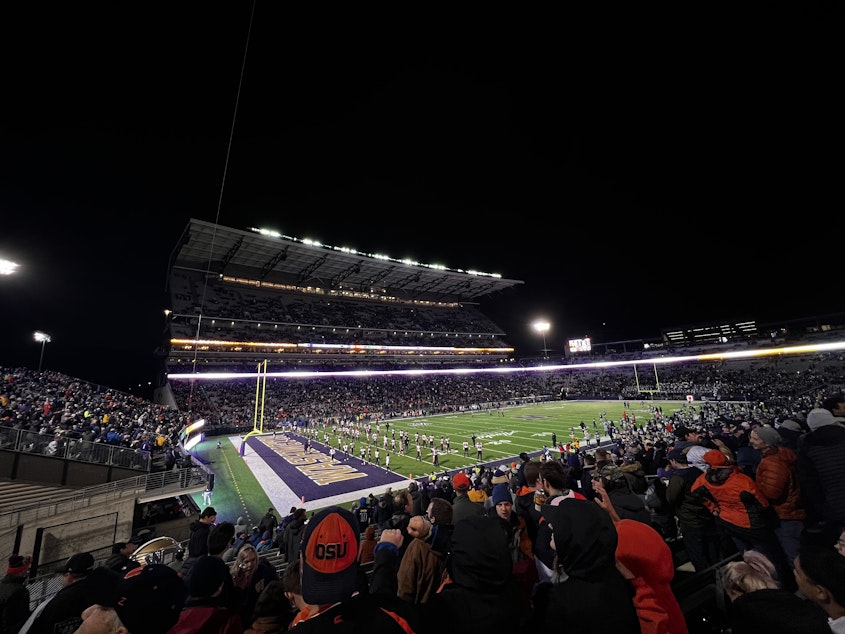What can the past tell us about the future of the PAC-12?

Pour one out for the PAC-12, or the...PAC-4. Who knows — by the end of the day it may be the PAC-2.
The prestigious West Coast college athletics conference imploded last week as two Pacific Northwest schools jumped ship for bigger rivals and even bigger paychecks. Washington and Oregon will join the Big Ten starting in 2024.
But while realignment of this scale is seismic, it isn't unprecedented.
Former Husky football standout Terry Hollimon said he went through the stages of grief when he learned UW was leaving the conference. After some initial denial, "I was angry," Hollimon told Soundside. "There was so much history and tradition with the PAC-12 And so much honor and respect and so many rival reasons. I was just angry that that was all coming to an end."
Eventually, he found acceptance.
"The University of Washington had to leave. The PAC-12 wasn't holding up within the bargain when it comes to the finances, and really just promoting and marketing and making the conference viable."
As the dust starts to settle, Hollimon said he sees the move as a glass-half-full situation. In the new conference, the Huskies will regularly face high-ranking opponents and higher pressure.
He’s hopeful that with the loss of some traditions comes the addition of new ones.
Sponsored
"At the end of the day, I hope it all works out for the best for the student athletes first and foremost, and then the program secondly," he said. "My dream is that UW is now being put on a higher level on a national scale where more people are watching the dogs play week in and week out."
The demise of the PAC-12 and the realignment of conferences leave a lot of open questions about the future of rivalry games, the effects of a new, geographically spread-out conference on team travel, and what the new economic realities of college sports mean for players and fans.
To learn more about conference origins, past realignments, and the challenges facing the NCAA going forward, Soundside spoke with Christian Anderson and Amber Fallucca. Anderson and Fallucca both teach at the University of South Carolina and are authors of the book, "The History of American College Football."
"I don't think we've ever seen an upending of a conference quite like this before," Anderson said. "But it's also not unprecedented. These kinds of conference realignments have been going on since the first conference was founded in 1896, which was known as the Intercollegiate Conference of Faculty Representatives, which is a mouthful — but now we just call it the Big 10."
Fallucca emphasized that the chaos around the PAC-12 accompanies recent and major changes in college athletics, such as the addition of NIL (name, image, and likeness) rights for players, which allows them to earn money from their personal branding. That funding is often championed and channeled through collectives, which are groups of alumni and other influential figures that are redirecting funds that used to go to athletic departments directly.
Sponsored
That means revenue from broadcast deals is that much more vital for the health of programs across the country.
"Programs are very concerned about how they're going to maintain facilities, how they're going to grow, and have better facilities coaching, salaries support," Fallucca said. "I've heard from a couple people in athletics departments at other institutions who have shared [that] this actually wasn't maybe on the radar on day one. But it's clearly come up as a concern of how our athletics department is going to keep up this supposed arms race, but also maintain support for the collective, which we know will drive the student athlete interest."
One chief concern among players and fans is the impact this realignment will have on historic games like the Rose Bowl, and the annual rivalry games like UW and Washington State University's Apple Cup. Anderson gave an encouraging example: In South Carolina, in-state rivals University of South Carolina and Clemson still play an annual rivalry game, despite being housed in different conferences.
"A lot of identity and interest is pinned to that rivalry and if it goes away, maybe fans' diminishing interest in college football fades away completely," he said.
You can listen to the full Soundside segment by clicking "play" on the audio above.





